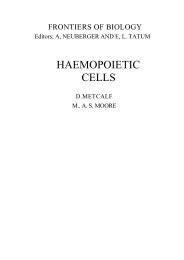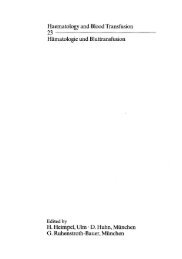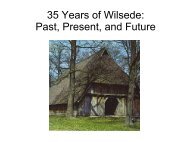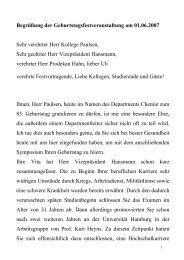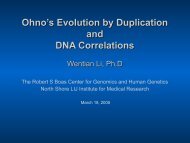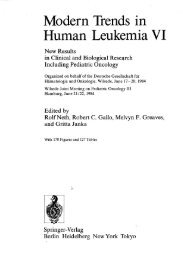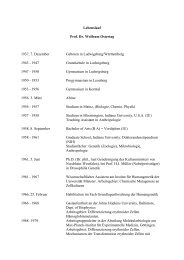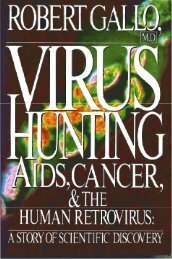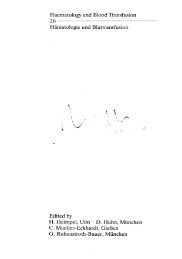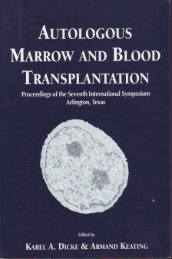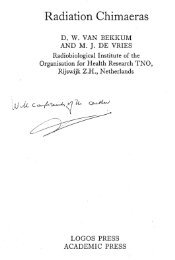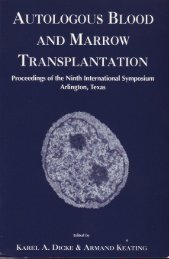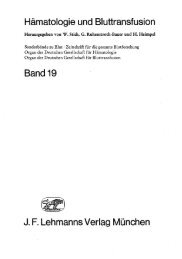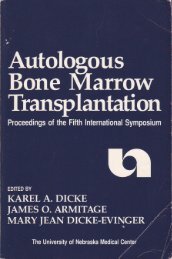VI Autologous Bone Marrow Transplantation.pdf - Blog Science ...
VI Autologous Bone Marrow Transplantation.pdf - Blog Science ...
VI Autologous Bone Marrow Transplantation.pdf - Blog Science ...
You also want an ePaper? Increase the reach of your titles
YUMPU automatically turns print PDFs into web optimized ePapers that Google loves.
Of the 14 limited stage patients in or near CR, 9 (64%) remain disease free at<br />
a median 24 (1276+) months followup. Relapse was primarily in sites of prior<br />
involvement and within the first year, but one patient died of adenosquamous<br />
lung cancer. Of the 7 ED pts in or near CR, 2 (29%) remain disease free at a median<br />
10 months followup and one patient is alive with disease at 65 months.<br />
The unmaintain remission and survival post ABMT appears favorable, particularly<br />
in those patients with an excellent preABMT response, compared with<br />
that expected from conventional chemoradiotherapy. Additional patients and<br />
further followup are needed to evaluate its utility in extensive disease in excellent<br />
response. For limited stage patients in or near complete response, a randomized<br />
comparison between this approach and conventional dose therapy is being<br />
developed.<br />
INTRODUCTION<br />
SCLC is a tantalizingly resistant solid tumor to chemoradiotherapy.<br />
Chemoradiotherapy at conventional doses has resulted in high response rates:<br />
80-100% (50-70% complete) for disease limited to the chest, and 60-80% (20-40%<br />
complete) for metastatic disease 1. However, cure is elusive. Median survival of<br />
14-18 months for limited disease and 8-12 months for extensive disease are<br />
achieved. About 20% of limited stage and 5% of extensive stage patients will<br />
survive two years. Survival beyond 5 years occurs in 3-8% of patients with<br />
SCLC 1.<br />
The inability to destroy the residual cells despite "chemosensitivity" suggests<br />
the existence of a tumor stem cell resistant to cytotoxic therapy. Maximizing<br />
dose and dose intensity to the limits of acceptable toxicity might overcome<br />
resistance 2,3. Hematopoietic stem cell support, using marrow or peripheral<br />
blood progenitor cells, provides the opportunity to evaluate dose-response to<br />
the hmits of organ tolerance.<br />
This phase II trial was designed to determine the disease-free & overall survival<br />
of patients with SCLC responding to conventional dose chemotherapy following<br />
treatment with high dose combined alkylators (cyclophosphamide,<br />
cisplatin and carmustine) and radiotherapy, to ascertain the subset of patients<br />
most likely to benefit and to evaluate the toxicity associated with this therapy.<br />
The first 19 patients with limited stage disease have been previously described 4.<br />
METHODS<br />
Adult patients aged 18 to 59 with histologically documented small cell lung<br />
cancer, responding to first line conventional dose induction chemotherapy, were<br />
eligible for this study. At the time of high dose chemotherapy, patients were required<br />
to have a performance status of 0-1, with leukocytes >3000/ul, platelets<br />
>100,000/ ul, creatinine clearance > 60 cc/min and SGOT and bilirubin < 1.5 x<br />
normal and no active tumor involvement of the brain or marrow. Pulmonary<br />
function had to be > 60% of predicted (FVC, DLCO corrected for hemoglobin)<br />
were required. Written informed consent was obtained.<br />
The treatment schema is outlined in Figure 1. As patients were usually referred<br />
after initiation of induction therapy, no specific induction chemotherapy<br />
was required. After maximal response from induction chemotherapy (generally<br />
~4 cycles), eligibility was determined with restaging studies including head,<br />
262 SIXTH INTERNATIONAL SYMPOSIUM ON AUTOLOGOUS BONE MARROW TRANSPLANTATION



